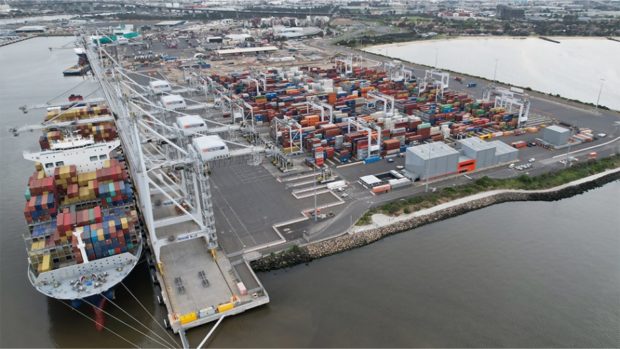
Victoria International Container Terminal at the Port of Melbourne -Contributed photo
International Container Terminal Services Inc. (ICTSI) is eyeing to spend more than $343 million on its port in Australia to expand capacity amid heightened cargo movement with the reopening of the global economy.
In a statement on Friday, the billionaire Enrique Razon-led port operator said it was keen on further developing Victoria International Container Terminal, its wholly owned subsidiary located in Port of Melbourne, Australia. It has so far invested $481 million there.
“The design would deliver higher operating efficiencies at a lower development cost and, importantly, with a significantly reduced environmental impact compared to competing proposals,” the company said.
The expansion plan seeks to increase the terminal’s container capacity to 3.7 million twenty-foot equivalent units (TEUs). This will allow the company to cater to larger ships.
“Victoria’s growing economy presents the Port of Melbourne with the opportunity to consolidate its position as Australia’s number one container port,” ICTSI executive vice president Christian Gonzalez said.
“Our vision for this operation is in lockstep with that of the Port of Melbourne’s own vision as it examines strategies to expand capacity and facilitate the growth of Victorian economy,” he added.
ICTSI also announced recently that its Mexico-based subsidiary Contecon Manzanillo SA de CV (CMSA) had started with the third phase of its $230-million expansion project.
The project is expected to boost capacity to more than two million TEUs within the next five years from the current 1.4 million TEUs.
CMSA is the first to be confirmed as a carbon neutral terminal in Mexico’s port industry.ICTSI saw its nine-month net income last year improve by 47 percent to $465.1 million due to higher container volume and port revenues. Gross revenues from port operations rose by 20 percent to $1.64 billion as the market recovered from the impact of the pandemic.
In Drewry’s Global Container Terminal Operators Annual Review and Forecast for 2021-2022, ICTSI ranked 8th among global terminal operators for handling 10.1 million TEUs in 2020.